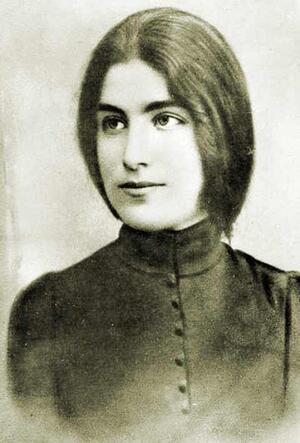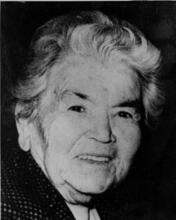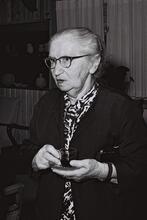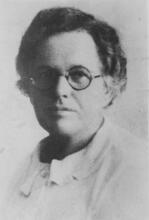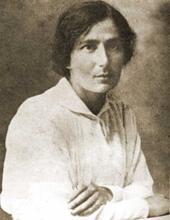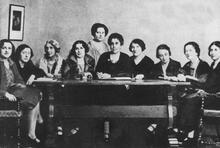Hannah Maisel-Shohat
Hannah Maisel-Shohat was a Russian-born agricultural educator and Zionist activist whose efforts resulted in the establishment of several training farms still in operation in modern Israel. After finishing secondary school in her hometown of Grodno, Maisel invested her energies in the local Zionist group Po’alei Zion. Through her work she concluded that those planning to emigrate to Palestine—women included—must know how to work the land. After several years of study in Switzerland and France, Maisel moved to Palestine, where she was disappointed to find no farms or agriculture programs for women. She created her own training framework for women and beginning in the 1920s successfully lobbied international organizations to sponsor the establishment of educational farms for women in Palestine.
Family and Education
Hannah Maisel was born on December 12, 1883, to an affluent family in the city of Grodno (Horodno, Belarus). Her father, Yitzchak Maisel, an exporter of wheat and furs to western Europe, emigrated to Palestine after World War I and died c. 1936–1937. Her mother, Reizel, a homemaker, died in 1927. Hannah was the fifth of their twelve children and the fourth daughter. Eight of the children ultimately emigrated to Palestine. One daughter, Rachel, died by suicide in Jaffa in 1910. Leah, who married on the same day as Hannah, was a teacher in Safed. She became one of the founders of the Hebrew Women’s Federation (Histadrut Nashim Ivriyyot) and later treasurer of WIZO, the Women’s International Zionist Organization. She was also a candidate for the Knesset. Other members of her family who came to Palestine were David Misha Baruch, Liza, and Dora. The latter died by suicide after losing two children in World War I. Sarah, who went to Switzerland to study medicine, also died by suicide. Two brothers, Gershon and Motke, emigrated to the United States, where Hannah visited them in the 1950s.
Although the father was a strictly Orthodox Jew, he nonetheless permitted his daughters to study at a non-Jewish school. On completing primary school in 1895, Maisel began her studies at the government gymnasium for girls in Grodno. Her involvement in Zionist activities in Po’alei Zion was outstanding even during her secondary school years. In 1902 she completed her studies at the gymnasium with distinction and continued to study on her own for an additional examination in Latin, which she passed successfully, thus entitling her to enroll in a pharmacology course.
Growing Commitment to Zionism
At the time (1903–1904), women in Russia were not admitted to agriculture studies in institutions of higher learning. Therefore, upon completing her secondary school studies, Maisel continued her activities in Po’alei Zion in Grodno with even greater vigor and was the driving force behind the organization’s varied activities, including literature classes and Hebrew language studies. Despite her youth she was chosen to head the Po’alei Zion Society in Grodno in 1903, succeeding Leib Jaffe (1876–1948), who had left for Palestine. At one stage she was imprisoned by the authorities. Forced to leave the city upon her release, she moved to Odessa.
As an active Zionist Maisel was interested in all that transpired in Palestine and sought to understand the hardships experiences by the First Lit. "ascent." A "calling up" to the Torah during its reading in the synagogue.Aliyah and the reasons for the failures that beset them. She felt that the problem of women’s inclusion in agricultural work in the settlements in Palestine was too weighty an issue to be ignored and that it stemmed from the inadequate preparation the young girls received before immigrating to their new rural life. To avoid repeating this error Maisel decided that she must first prepare herself for agricultural work, even before immigrating to Palestine.
In 1905 Maisel was elected a delegate of Po’alei Zion to the Seventh Zionist Congress in Basel. She remained in Switzerland after the Congress and began studies in natural sciences in Bern. These academic studies, however, were not in line with the training she sought. Her goal was to acquire both practical and theoretical education that would prepare her for agricultural work in Palestine, and in order to achieve this goal she left Bern for Niederlenz (Switzerland), becoming a student in the first class of the school of gardening for women. After one year of studies in Niederlenz, Maisel was accepted to Besançon University in France where she studied from 1907 to 1909. During this period she also worked in an experimental station for vegetables and orchards. Maisel completed her doctoral studies with distinction. Her areas of study served to reinforce her professional conviction regarding the importance of women’s work in agriculture. According to Maisel, the Zionist idea of a return to working the land was a necessary but insufficient precondition, and in order to implement it, actions of both men and women were necessary.
Emigration to Palestine
After completing her studies in 1909, Maisel immigrated to Palestine and upon her arrival toured the agricultural settlements (Lit. "village." The dominant pioneer settlement type of the Jews in Palestine between 1882moshavot) of Judea to acquaint herself with the various areas of work involved.
There were no agricultural training institutions for women in Palestine at the end of 1909. Maisel searched for a place of employment where she could gain local experience that would augment the practical knowledge she had brought with her from abroad. After several months of wandering and searching, Maisel obtained work at the Sejera Farm (today located in Ilaniyyah). Only upon Hannah’s arrival at Sejera were the women pioneers who had remained on the farm after the dismantling of the collective (the agricultural collective founded there in 1907 by Mania Shohat that included twelve men and six women and lasted one year) introduced to the idea that amazed them with its simplicity: women, claimed Maisel, should not attempt to seek equality with men in work not adapted to their abilities or physical attributes. Rather, they must give expression to the “female voice” in agriculture, in other words train themselves for the development of special branches of agriculture suitable for them.
In 1911 Maisel established her first agricultural training framework, Havat ha-Alamot (the Young Women’s Farm) at Kinneret, as part of the Zionist Federation’s Kinneret Farm. Maisel’s enterprise continued to operate through 1917. Havat ha-Alamot was supported by the Verband jüdischer Frauen für Kulturarbeit in Palästina (The Jewish Women’s League for Cultural Work in Palestine), an organization of German Zionist women whom Maisel enrolled to assist in the agricultural training. She had met members of this organization during a visit to Berlin in 1910, only one year after her immigration to Palestine.
In 1912 Maisel married Eliezer Shohat (1874–1971). The couple had no children.
As a Russian subject, Maisel was forced to leave Palestine in 1917. In England in 1919 she met with Vera Weizmann, Rebecca Sieff, and Edith Eder, who had just returned from a visit to Palestine. Maisel returned to Palestine at the end of 1919 and the following year sent a letter to the founding conference of WIZO, in the establishment of which the three women had participated. This conference was held in London but when the first conference of the new women’s organization was held in Carlsbad in 1921, following the twelfth Zionist Congress, Maisel was present as a founding member. In addressing her fellow members she mobilized them to support agricultural training for women. She also persuaded WIZO to change the original purpose of the “hostel” that the organization planned to establish for women in Tel Aviv to that of a “school for homemaking and agriculture,” which she herself established and managed during the years 1922–1923. As a delegate to the Zionist Congresses in Carlsbad in 1921 and 1923 and as a participant in WIZO conferences held during these years, Maisel continued to maintain ties with women’s organizations abroad.
The Establishment of Women’s Farms
At the beginning of the 1920s Maisel supported and assisted in the establishment of Mishkei ha-Po’alot (women’s farms) in Petah Tikvah and Nahalal Yehudah. The founding of the agricultural school for young women in Nahalal was the culmination of her lifetime endeavor—the training of women in agricultural professions—and she managed it until her retirement in 1960. In February 1921, the first convention of Hadassah Canada took place and a letter from Hannah Maisel was read. In the letter, Maisel challenged the new organization to take under its patronage the establishment of an agricultural school for women. In her words: “The Jewish village could never be built without the active participation of women and this participation could not prosper without prior preparation. … The first work of Zionist women should therefore be the immediate establishment of a central agricultural school for women in this country, of which, in the course of time, branches could be extended all over the country” (CZA S15 20/100).
The convention accepted the challenge set by Maisel, adopting the following resolution: “That Canadian Hadassah be directly associated with one specific undertaking in Erez Israel and that this be to establish a school for Household Science, as outlined in Maisel’s letter.” Within half a year $88,000, a huge sum of money for that period, was raised for the establishment of the school. This amount was the estimated budget needed to build an agricultural school for sixty students, including the buildings, the farm, and inventory. Since no land was set aside for the school at the time, the money was used by Keren Hayesod for other purposes. It took a couple of years longer for Maisel to establish the school near Nahalal.
The school was the epitome of collaboration between women’s organizations and agricultural training. A large, modern school that formally opened its doors in 1926, it was originally planned for 60 female students and trained hundreds of graduates over the years. Another milestone in the development of the school was the first visit to Erez Israel of Hadassah Canada’s president, Lillian Freiman, in 1927. Impressed by the school and its achievements, Freiman convinced Hadassah Canada to undertake full financial responsibility for the First Agricultural College for Women in Erez Israel, as she called it. At the fifth Hadassah conference, held in Winnipeg in July 1927, they did just that, including paying back former investments. At this point, ownership of the school was officially transferred to Hadassah Canada.
With time, the school changed from a boarding school for women over eighteen years of age to a high school for boys and girls. Named after Hannah Maisel, the school operates to this day and serves as an agricultural and regional high school for the children of the Jezreel Valley Regional Council. The school’s women graduates integrated into many agricultural settlements established during the 1920s, 1930s and 1940s. Some became agricultural instructors and others won agricultural awards.
In 1921 Hannah and Eliezer Shohat had been among the founders of Nahalal, the first moshav ovdim (workers’ agricultural settlement), and they maintained a farm there during its early years. Upon Maisel’s retirement the couple moved to an apartment they owned in Tel Aviv. Hannah Maisel died on March 28, 1972, and was buried beside her husband, Eliezer Shohat, in the cemetery at Nahalal.
Carmel-Hakim, Esther. Agricultural Trianing for Women. Translated by Fern Sackbach. Ramat Ef’al: Yad Tabenkin, 2007; republished by Hadassah-Brandeis Institute 2016. http://bir.brandeis.edu/handle/10192/31730.
Carmel Hakim, Esther. Shalhevet yeruḳah : Ḥanah Maizel - mifʻal ḥayim (Hanna Maisel's Lifelong Mission: Agricultural Training for Women). Ramat Ef’al: Yad Tabenkin, 2007.
Carmel-Hakim, Esther. “Hannah Maisel—From Kinneret to Nahalal.” MA-equivalent thesis, Bar Ilan University, 1997.
Carmel-Hakim, Esther. “The Professional-Agricultural Training of Women in the Yishuv and the Assistance of Jewish Women’s Organizations: 1911–1929.” Ph.D. diss., Haifa University, 2003.
CZA [Central Zionist Archives] S15 20/100, June 1920 translation of the original letter that was written in Hebrew.
Farber, Rina. Hed Kinneret Higi’a ad Halom (The Echo of the Kinneret Reached Thus Far). Tel Aviv: WIZO, 1980.
Fishman, Ada. The Women’s Worker Movement in Palestine 1904–1929. Tel Aviv: Moazath Hapoaloth, 1929.
Izraeli, Dafna, and Deborah Bernstein. “Ha-Po’alot ba-Aliyyah” (Women Workers in the Second Aliya). In Ha-Aliyyah ha-Sheniyyah (Second Aliya Research), edited by Israel Bartal, 294–306. Jerusalem: Hotsaʼat Yad Yitsḥaḳ, 1997.
Izraeli, Dafna. “Tenu’at haPo’alot be- Eretz Yisra’el mi-Reishitah ve-Ad 1927” (The Women’s Worker Movement in Palestine from Its Inception until 1927). Cathedra 56 (1984): 109–140.
Maisel, Hannah. ““Ha-Hinnukh ha-Kafri shel ha-Tze’irot” (The Rural Education of Young Women). Be-Sha’ah Zu (1916): 56–62.
Maisel, Hannah. “Le-Hinnukh Hakla’i la-Po’alot” (Agricultural Education for Women
Workers). Ha-Po’el ha-Za’ir 38 (1922): 5–6.
Rabin, Dov, editor. Entziklopedya shel Galuyyot (Encyclopedia of Diasporas), vol. 9. Jerusalem: Ḥevrat Entsiḳlopedyah shel galuyot, 1973, 166–171.
Shilo, Margalit. “Havvat ha-Po’alot be-Kinneret 1911–1917” (The Women’s Agricultural Training Farm at Kinneret, 1911–1917). Cathedra 14 (1980): 81–112.
Shilo, Margalit. “Hannah Maisel-Shohat.” In Ha-Aliyyah ha-Sheniyyah: Ishim (The Second Aliyah: Personalities), edited by Ze’ev Zahor, 255–258. Jerusalem: Yad Izhak Ben-Zvi Press, 1997.
Smilanski, Moshe. Family of the Land, vol. 1. Tel Aviv: 1943.

